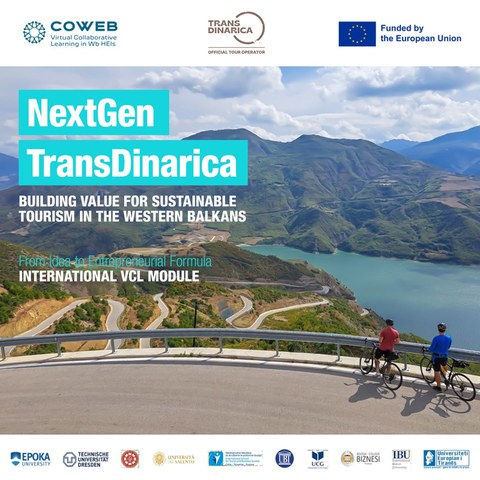Apr 16, 2025
COWEB launches international VCL module with 140 students and teachers from 9 countries

Teaser poster for the kick-off of the module
On April 9, 2025, the COWEB project launched the international module for Virtual Collaborative Learning (VCL) entitled "NextGen TransDinarica: Building Value for Sustainable Tourism in the Western Balkans". The kick-off event took place online via Microsoft Teams and brought together 143 students, lecturers and project partners from a total of nine countries for a kick-off meeting.
The event was moderated by Dr. Esmir Demaj (EPOKA University), project manager of COWEB, who welcomed the participants and introduced the program. Dr. Agim Kasaj (UET) began with a presentation on the TransDinarica initiative. He explained the project's objective of strengthening the cross-border cycle route as a driving force for sustainable regional development.
Mattis Altmann (TU Dresden) presented the pedagogical approach of the VCL and emphasized the relevance of virtual mobility and intercultural exchange as an integral part of academic courses. He presented the didactic concept, which is based on case-based and situated learning and is supported by synchronous and asynchronous collaboration in interdisciplinary teams. The module also promotes the development of professional, personal and social skills - key qualifications for successful participation in international project contexts.
MSc Anisa Isufi (EPOKA University) introduced the role of the e-tutors, who support team communication, coordination and student engagement throughout the eight-week module. Dr. Valentina Ndou (University of Salento) then presented an introduction to the Business Model Canvas, which is used to promote strategic thinking, innovative approaches and the consideration of stakeholder interests.
The session ended with an open Q&A session and a practical introduction to Microsoft Teams, where students explored their group chats and made first contacts with fellow students and e-tutors.
The module brings together a broad consortium of universities and institutions from Albania, Germany, Italy, Slovenia, Kosovo, Bosnia-Herzegovina, Montenegro, Tunisia and Georgia. The aim is not only to promote academic cooperation, but also to challenge students to jointly develop viable solutions for sustainable tourism in the Western Balkans.
By combining science-based teaching with real-world challenges, the international VCL module represents a concrete step towards strengthening cross-border cooperation - empowering the next generation of professionals to think critically, act collaboratively and lead sustainably.
